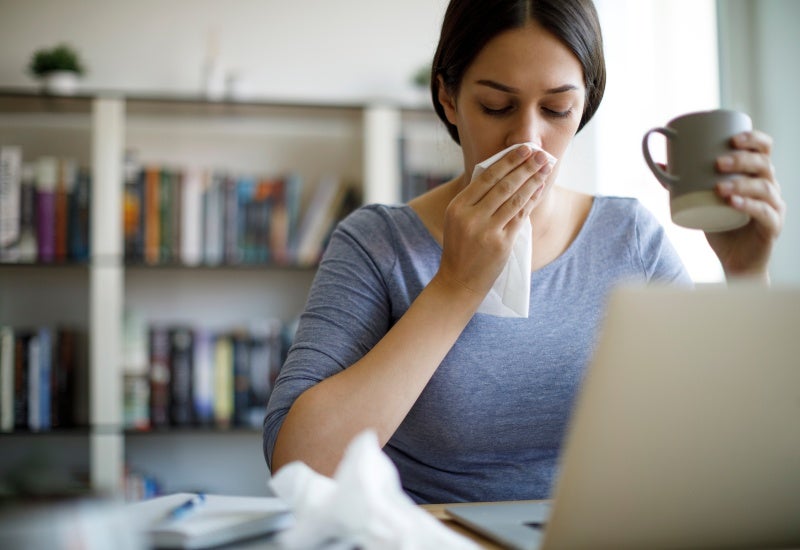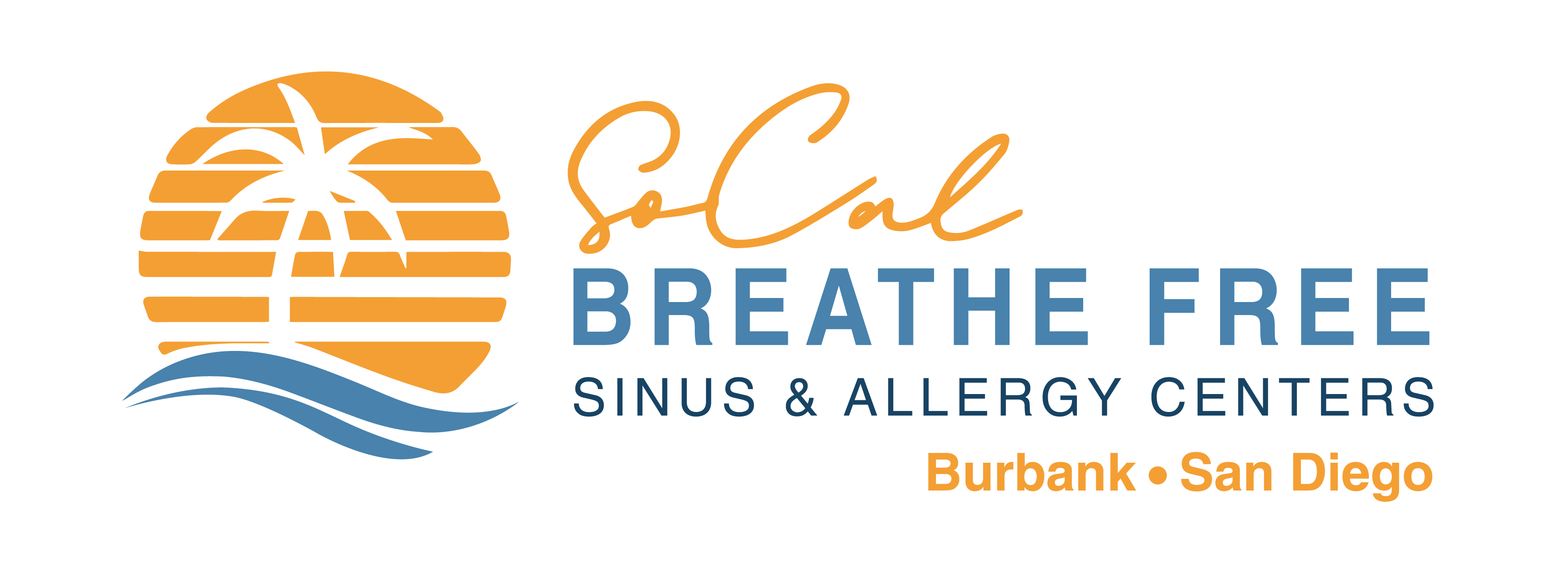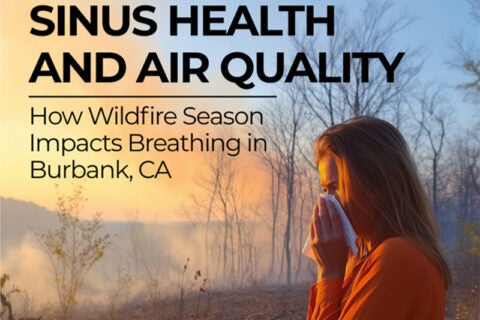Can Allergies Cause a Sinus Infection?
It’s common to mistake allergies for a sinus infection, but the truth is they’re more closely related than many people realize. It’s common to wonder: Can allergies turn into a sinus infection? The short answer is yes, they can. Take a closer look at how allergies affect the sinuses, why they can cause an infection, and how to keep your sinuses healthy.

What Is a Sinus Infection?
A sinus infection, also known as sinusitis, occurs when the tissues lining your sinuses become so inflamed and swollen that they obstruct normal drainage. This blockage allows mucus to accumulate, which creates an environment favorable for microorganisms to grow.
Common sinus infection symptoms include:
- Facial pain and pressure, especially around the cheeks, eyes, or forehead
- Nasal congestion
- Thick, discolored nasal discharge
- Reduced sense of smell and taste
- Postnasal drip and throat irritation
- Headache, fatigue, and sometimes fever
Sinusitis may present as acute (short-term, often following a cold), chronic (lasting 12 weeks or more), or recurrent (multiple episodes of acute sinus infections within a year). What they all have in common is impaired drainage and persistent inflammation.
How Do Allergies Affect the Sinuses?
When you’re allergic to something, your immune system overreacts and releases histamines to combat a substance it deems harmful (even if it’s harmless). Histamines dilate your blood vessels, make blood vessel walls more permeable, and trigger other responses in an effort to flush out the allergen.
The consequences of these responses include:
- Sneezing, itching, and mucus production
- Swollen tissue blocking mucus from clearing out
- Stagnant mucus, which becomes thicker and harder to move the longer it sits
- Impaired cilia, tiny hair-like structures that sweep mucus
- Bacteria, viruses, or fungi settling in and flourishing
Can Allergies Cause a Sinus Infection?
Allergies can contribute to conditions that increase the risk of sinus infections, such as blocked drainage and mucus buildup. However, not all allergy sufferers develop sinus infections, and other factors may be involved.
When allergy-induced swelling blocks drainage, trapped mucus becomes a breeding ground for microorganisms. In some cases, untreated allergies may contribute to conditions that increase the risk of developing a sinus infection. That’s why you may have heard ENT and allergy specialists warn that untreated allergies can lead to recurrent or chronic sinusitis.
Here are some clues that your sinus infection is allergy-related:
- You notice symptoms during high pollen seasons. Tree pollen peaks in the spring, grass pollen thrives in the summer, and weed pollen dominates in the fall.
- Sinus infection symptoms overlap with signs of allergies, such as itchy eyes and sneezing.
- You have had multiple sinus infections over the years.
- Standard sinus infection treatment doesn’t last.
Are Some Allergies More Likely to Trigger a Sinus Infection?
Yes. While any allergy can contribute, allergies to pollen, mold, dust mites, and pet dander carry the highest risk. Other complicating factors include:
- Structural problems, such as a deviated septum or nasal polyps
- Exposure to pollutants or cigarette smoke
- Immune system issues
- History of multiple colds or viral infections every year
Allergies may contribute to chronic sinus issues in some patients, especially when standard treatments are not effective. An ENT or allergy evaluation can help determine the underlying causes.
What Sinus Infection Treatments Work When Allergies Are Involved?
When allergies and a sinus infection coexist, treatment must do double duty. Here are some common approaches for relieving infection and managing allergy triggers.
Medications & Home Care
These treatments can help reduce symptoms and support drainage, though they may not fully address all structural or chronic issues:
- Nasal saline rinses
- Nasal corticosteroid sprays
- Oral antihistamines or leukotriene modifiers
- Short-term decongestants
- Antibiotics (if a bacterial infection is confirmed)
- Corticosteroid bursts (in more severe cases)
Allergy‑Focused Therapy
When you lower your body’s allergic response, your sinuses have a better chance of staying healthy. Here’s what to try:
- Allergy testing to identify your triggers
- Immunotherapy to desensitize your immune response
- Environmental controls like running HEPA air purifiers, using dust mite pillow cases, and remediating mold in your home
In-Office Procedures & Minimally Invasive Surgery
When medication and allergy control aren’t enough, it’s time to consider an ENT procedure, such as:
- Balloon sinuplasty: Balloon sinuplasty may help improve sinus drainage in select patients with chronic sinusitis. Your ENT provider can evaluate whether this treatment is appropriate based on your condition and medical history.
- Endoscopic sinus surgery: Using an endoscope, surgeons clear blockages, remove inflamed tissue, and restore sinus airflow.
Take the Next Step to Breathe Free
If you’re tired of chronic congestion, repeated sinus infections, and symptoms that flare up during allergy season, it’s time for an expert evaluation. At SoCal Breathe Free Sinus & Allergy Centers in San Diego and Burbank, we offer evidence-based ENT and allergy care options, including minimally invasive procedures designed to support symptom relief. A single treatment isn’t effective for everyone, so we’ll work closely with you to find the right solution, whether that’s prescription allergy medication and immunotherapy, balloon sinuplasty, or an endoscopic procedure. Complete our Sinus Self‑Assessment, and someone from our office will reach out to you about your results.
The information provided in this article is for informational and educational purposes only and does not constitute medical advice. It is not intended to diagnose, treat, cure, or prevent any disease or medical condition. Always seek the guidance of your physician or other qualified healthcare provider with any questions you may have regarding a medical condition or treatment.
Results may vary: Treatment outcomes and health experiences may differ based on individual medical history, condition severity, and response to care.
Emergency Notice: If you are experiencing a medical emergency, call 911 or seek immediate medical attention.


